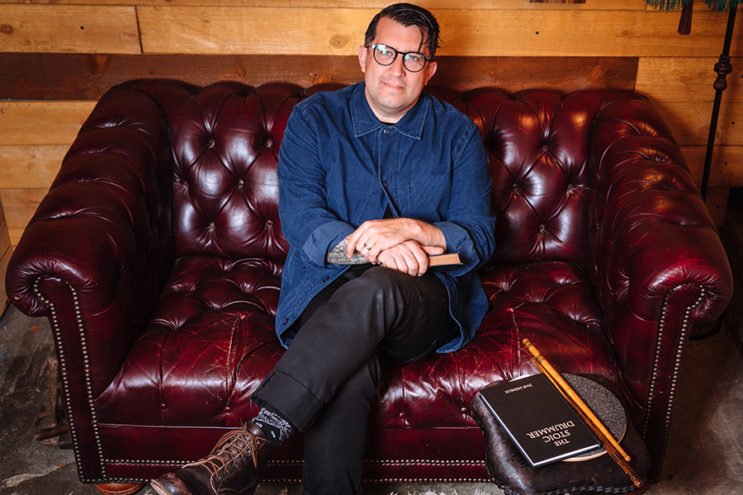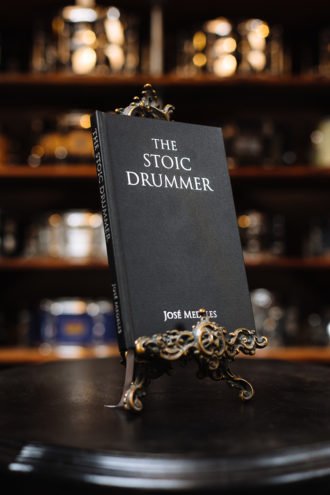Portland Author and Drummer José Medeles


Next to a 76 gas station on East Burnside Street in Portland is Revival Drum Shop, owned by José Medeles, who has played with The Breeders, Joey Ramone, Donavon Frankenreiter, Ben Harper and Modest Mouse, and currently leads 1939 Ensemble, a modern avant-garde jazz band. He recently wrote and self-published The Stoic Drummer, a collection of mantras and axioms for his fellow drummers.
It takes a certain type of musical mind to create the rhythm and structure necessary for any song, but drummers are sometimes overlooked as integral parts of the band. José used the ancient wisdom of stoics like Marcus Aurelius and Epictetus to enhance his lifelong practice of drumming, in turn changing his complete outlook on life. With a heartfelt forward from Billy Martin of Medeski, Martin, and Wood, The Stoic Drummer is the perfect companion for any serious drummer who needs some assistance focusing on their craft during these difficult times. Its Zen-like layout alone helps concentrate the mind on the wise words within. When I met José for this interview, I found his mindfulness and thoughtfulness to embody the very tenets of stoicism that inspired his work.
ELEVEN: Can you tell me about the philosophy of stoicism, as it relates to drumming?
José Medeles: To be clear, I never studied philosophy in college. I never went to college. I practice stoicism, but I’m not an expert. This book is a representation of my healing and the journey that I’ve been on. Stoicism is a Roman philosophy, and it’s a practical philosophy that really just asks the question: What is the good life? How do you live? How do you be an internal hero in your own story? So when I discovered stoicism, I was going through struggles, and looking for something. Music has always been my religion. I was brought up Catholic, but when I discovered stoicism… it must be like when people go to the bible. I try not to go there but for me, it’s the only way I can describe it. This is my journey. I’m not advocating anything. This is my peace, and my path. And it was incredible, because I started to practice stoicism and asking myself questions every day and journaling every day and reading every day, it made me a better husband, a better father, a better friend and a better human in general. I felt more content in my life, I felt more content in my own skin. It allowed me to walk softer, talk softer. I still have my moments, just like anybody. It’s nice because it’s a very forgiving philosophy.
When you start reading Marcus Aurelius’s Meditations, or Seneca’s Morals (Moral Letters to Lucilius) and Epictetus, it starts leading to some really solid things. What I started to do was reflect on how much this was enhancing my life and my being, so I started to apply some of these practices to drumming. Because drumming is as much of a part of my life as is being a father, a husband, a business owner. Being a drummer is right there. I really thought that I was a content drummer before, but after practicing some of these meditations and mantras and applying them to drumming, it took it to the next level. When I was in my little side yard writing and journaling, it hit me that I needed to let people know about this. I went and looked for a book like this, because if there were I would have bought it in a heartbeat. I wasn’t able to find something that melded essentially my two loves. What made me look forward to things. So I started going through and writing and applying the writings of essentially the OG stoics to the art of drumming. So it’s a book of really practical ideas.
11: Is this book only for drummers?
JM: What’s interesting is that I’ve had guitar players and artists go, “Man you can apply this to anything!” But of course, my world being drums it only made sense that I looked at it from the POV of the drummer. I’ve had people reach out to me and say that they bring this book with them to gigs and read parts of it before they play. That to me is huge. I just love that there’s something coming out of my struggles. And that I’m continuing that process of adding to my drumming community.

11: So is that what made you put it on paper?
JM: I felt the same way about drumming so many years ago–I had to do it. It’s the same thing with Revival. Once I realized what was happening, I had to do it. I had to open up the shop. Same thing with my music, with 1939 Ensemble and my solo stuff. I have to do it. And I felt that was with the book, If we sell four it will be ok. I also feel that way about my music. I don’t feel like you should as an artist, just make something and let it sit and not see the light of day. This book is self-published so I’m not sure how to get this to the next level but I’m just enjoying this moment because it has no “have to’s.” I’m just happy that it’s bringing light to the world, and to drummers. And it’s all out of love, which is what makes me happy.
11: Can you speak about the general role of the drummer in the band?
JM: Being a drummer, I feel that our role can be very disposable. If the singer decides to put out a solo record, or decides to pivot in any way. A lot of time, we’re just kind of left out. I needed to remind myself of why I became a drummer, why I drum. Really, that is the seed of all of this. And also not being distracted by outside forces. As far as perception goes. You know, so you didn’t get that gig, and not be devastated. Not to go into this dark hole, or this cave. It’s just kind of knowing that no one causes you harm. Really it’s your choice. I know it’s starting to get into heady stuff, but it’s really important. There are so many distractions, and as musicians we get pummeled a lot. We have a lot of victories, don’t get me wrong. But when we get pummeled, we feel it. I feel that because we are artists, I feel that we have the sensitivity and the vulnerability and I just want to remind myself that no one can harm me. I’m not just talking musicality, I’m just talking about life in general, too. I think ultimately you want to get to a point where someone punches you in the face and you don’t even know it. I think that’s a neat goal. I just like the idea of walking softer.
11: Can you tell me about Revival Drum Shop as far as it being an anomaly in the business of selling drums?
JM: The shop started ten years ago. Revival is a vintage and custom drum shop. We focus on boutique drums and eclectic percussion and boutique cymbal-makers and percussion-makers. We celebrate the artisan side of the percussion world since the beginning. Fast forward almost ten years later and not only are we still around but we are being celebrated on a national and international level. Because of our business model we are kind of an enigma among the drum industry. We’re viciously independent. I love that we’ve kept our integrity, and haven’t pivoted. We’ve never had to bring in every drum company in the world to survive. And that is a beautiful thing. I think the tip of our spear is the love of what we’re doing there. The business and numbers are a part of it, but it’s not the main thing. And I think that that’s the trick.



